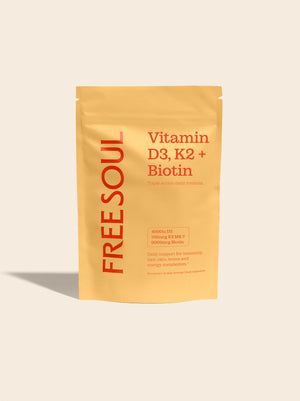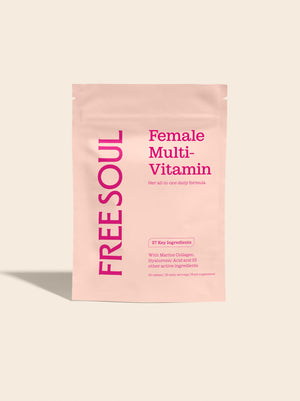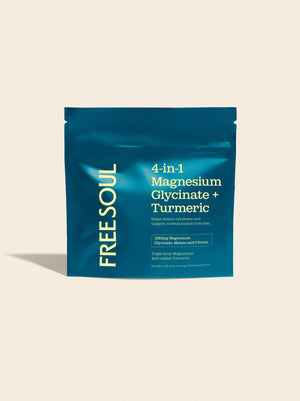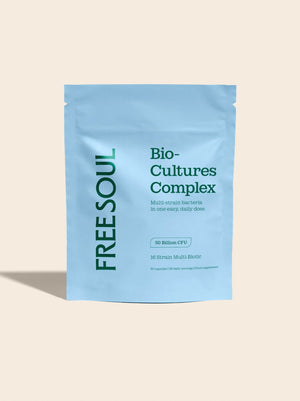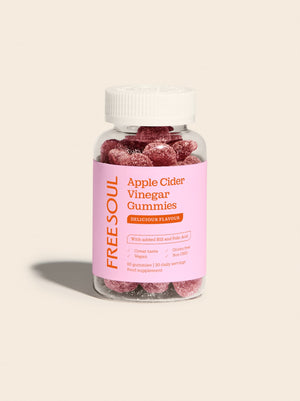Bloating and digestive discomfort? While they're common symptoms, they’re also just the tip of the iceberg when it comes to your gut.
The truth is, your gut does a lot more than just break down your lunch. It’s a central hub that talks directly to your brain, immune system and hormones via the gut-brain axis (think: a high-speed communication network running 24/7). And when it’s not happy, chances are it’ll make it known.
For women, gut health gets even more interesting and often, more complicated. Hormones, such as oestrogen and progesterone, play key roles in everything from digestion to microbial balance. Which means that the hormonal shifts we move through in different life stages (monthly cycle, pregnancy, perimenopause), can directly impact how our gut behaves.
Yet, women’s digestive health is still widely misunderstood. Too many women are told their symptoms are ‘just hormonal’ or something they should simply ‘put up with’. In the UK especially, gut issues often get brushed off - meanwhile on the continent, it’s practically small talk.
The worst part? Biologically, women are more susceptible to gut-related issues as a result of natural hormonal shifts linked to menstruation, pregnancy and menopause. These fluctuations can slow digestion, heighten sensitivity and disrupt the gut microbiome. Adding to this is the psychological stress women often carry, which can worsen gut symptoms, and you’ve got the perfect storm for gut discomfort. Meaning that, feeling bloated, sluggish or out of sync with your body can actually chip away at your overall wellbeing.
It’s time we brought women’s gut health into the spotlight. Because acknowledging the challenges is the first step towards better support, more research and personalised solutions. Gut health isn’t a ‘niche’ it’s central to how we feel, function and show up in the world.
How Your Gut and Brain Communicate
The gut–brain axis is basically the 24-hour hotline between your digestive system and your mind. This two-way communication runs via the vagus nerve, hormones, immune signals and even by-products from your gut microbes (Cryan et al., 2019).
Your gut isn’t just for digestion, it houses the enteric nervous system (ENS), often dubbed the “second brain”, with over 100 million neurons in its walls (BDA, 2020). And it’s busy producing key neurotransmitters that shape how you feel and function:
- Serotonin: About 90–95% is produced in the gut. It helps regulate bowel movements and mood.
- GABA: This calming chemical is made by certain gut bacteria to help support stress resilience.
- Dopamine: Microbes create dopamine precursors, supporting motivation and mood.
- Short-Chain Fatty Acids (SCFAs): Made when your microbes ferment fibre, SCFAs like butyrate and propionate strengthen your gut lining, reduce inflammation and even support brain health (SACN, 2022).
When this delicate system falls out of balance, known as dysbiosis, it’s not just your gut that feels it. It can affect mood, cognition, and even increase the risk of anxiety and low energy.
How Gut Health and Immunity Are Connected in Women
Around 70–80% of your body’s immune cells live in your gut. So no, the gut isn’t just about digestion! It’s a key player in your immune system too (British Nutrition Foundation, 2023).
Your gut microbiome helps train your immune system, keeping it balanced and responsive, not overreactive. A healthy gut also supports:
- The production of calming, anti-inflammatory compounds
- A strong intestinal barrier to block out unwanted guests
- A balanced immune response (no unnecessary drama)
Certain probiotic strains, like Lactobacillus rhamnosus and Bifidobacterium bifidum, have been shown to support immune resilience by reducing harmful bacteria and calming inflammation (Cryan et al., 2019).
Free Soul’s Bio-Culture Complex includes these research-backed strains and more to help support microbial diversity and long-term immune health - because when your gut’s thriving, your immune system is too.
Gut health is so much more
Your gut does a lot more than just support digestion. It produces neurotransmitters, supports immunity and can even help synthesise essential nutrients like Biotin, Folate and Vitamin K; key for energy, skin, hair and your blood health. A fibre-rich, diverse diet helps the right microbes thrive, boosting nutrient absorption and overall wellbeing.
What you eat directly shapes your gut. Diets high in ultra-processed foods and low in fibre can disrupt your microbiome, while whole foods, legumes, fermented foods and veg support a more balanced, resilient gut - and better health, inside and out.
You’ve probably heard of GLP-1. It’s a hormone made in the gut that helps regulate blood sugar and appetite by signalling fullness and supporting insulin. While weight-loss meds can mimic it, your body produces GLP-1 naturally, if your gut’s in good shape!
A healthy gut also supports satiety and appetite regulation by helping communicate fullness to the brain. And it plays a role in activating thyroid hormones, which influence metabolism and energy.
The takeaway? Your gut impacts far more than digestion. Think: mood, hormones, metabolism. And one of the best ways to support it? A varied, nutrient-rich diet.
How Female Hormones Affect Gut HealthFemale Hormones, Gut Microbiota, and Immune Health
Hormonal fluctuations can directly gut health. Oestrogen and progesterone influence gut motility, microbial composition and mucosal immunity.
- Oestrogen: This hormone enhances gut motility and promotes the proliferation of beneficial bacteria such as Lactobacillus species. Declining oestrogen levels during menopause are associated with reduced microbial diversity, slower bowel transit, and increased inflammation (Staudacher et al., 2021).
- Progesterone: Elevated in the luteal phase and during pregnancy, progesterone slows gut transit time, potentially contributing to bloating and constipation.
- Cortisol: Chronic stress elevates cortisol levels, which can disrupt the integrity of your gut barrier and microbial balance, linking psychological stress to digestive discomfort.
These hormone-driven changes highlight the need for tailored gut support, at every life stage.
How Gut and Immune Health Changes with Age
Let’s deep dive into gut and immune health across different women’s different life stages:
|
Age Group |
Life Stage Considerations |
Gut and Immunity Focus |
|
18–24 |
Late adolescence, contraceptive use, hormonal fluctuations |
Support microbiota diversity, counteract pill-induced microbial shifts, promote gut-brain balance with probiotics |
|
25–29 |
High stress, career demands, potential pregnancy |
Prioritise gut-brain axis resilience, support immunity with probiotics and fibre, manage stress via the vagus nerve |
|
30–35 |
Pregnancy, breastfeeding |
Optimise nutrient absorption, ensure microbial transmission to infants, reduce infection risk with a diverse microbiome |
|
36–45 |
Perimenopause, fluctuating hormones |
Alleviate bloating and irregularity, support hormonal balance with phytoestrogens, maintain mucosal immunity |
|
45–60+ |
Menopause, postmenopausal |
Replenish beneficial microbes, prevent inflammation, mitigate metabolic risk via SCFA production and probiotic support |
Supporting the Microbiome from Puberty to Menopause
18–24: The rhythm’s (almost) settled
After those turbulent teen years, your hormones typically begin to even out. Although for many women, factors (such as the pill) can still throw off gut balance - reducing friendly bacteria like Lactobacillus. This can lead to bloating, mood swings and immune dips. Probiotics like our Bio-Culture Complex help restore harmony and help you feel more like you.
25–29: Stress, sleep, and your gut on edge
Life feels busy and so your gut is put to work keeping up. Stress and ever-changing routines affect your gut-brain axis, which means your mood, immunity and digestion can all take a hit. Enter: probiotics and prebiotic fibre to keep things resilient and regular.
30–35: Pregnancy + postpartum = big shifts
Your microbiome adapts during pregnancy to support the baby and you. Probiotics can help with nutrient absorption, immunity and even reduce the risk of gestational diabetes. Bonus? A thriving maternal microbiome supports a baby's gut health, too.
36–45: Hello, perimenopause
Fluctuating hormones can bring bloating, constipation and inflammation. Supporting your gut with fibre, fermented foods and targeted probiotics helps balance digestion and support hormone metabolism.
45+: Post-menopause and gut resilience
As oestrogen declines, so do key gut bacteria so you can expect slightly sluggish digestion and inflammation. Probiotics help keep your gut diverse, your mood lifted and your metabolism ticking.
The Best Foods and Habits for Optimal Gut Health
A strategy for tackling your gut and immune health would ideally include:
- Dietary Fibre: Prebiotic-rich foods such as chicory, oats, bananas and legumes nourish beneficial bacteria. These increase SCFA production, especially butyrate, which reduces gut inflammation and supports mental clarity.
- Fermented Foods: Natural sources like yoghurt, kefir, sauerkraut, and miso contain live bacteria that contribute to microbial diversity. However, consistency and strain variety are essential.
- Probiotics: Supplementation ensures reliable and targeted delivery of beneficial strains. Free Soul’s Bio-Culture Complex contains 15 carefully selected strains, including Lactobacillus Rhamnosus and Bifidobacterium Breve, known for enhancing immune and cognitive function.
- Stress Management: Breathing exercises, yoga and vagus nerve stimulation can mitigate stress-induced gut issues. The gut-brain axis is highly sensitive to psychological states.
- Hydration and Physical Activity: Water aids digestion, while exercise promotes microbial richness and bowel regularity.
- Minimise Ultra-Processed Foods: These can impair microbial diversity, encourage pathogenic bacteria, and contribute to systemic inflammation.
Recommended by Nutritionists: Free Soul for Gut and Immune Support
Free Soul’s scientifically formulated supplements are designed to support women’s unique needs. The Bio-Culture Complex is particularly beneficial due to its potent blend of probiotic strains, supporting digestion, hormonal balance and immune function.
- Bio-Cultures Complex: Contains 39.5 billion CFUs of Lactobacillus acidophilus alongside 14 additional strains, each with a proven role in gut health and immune regulation.
- Free Soul Greens: Rich in fibre, digestive enzymes and antioxidants, this blend aids detoxification and supports SCFA production.
- Apple Cider Vinegar Gummies: Enhance gastric acid levels, improve nutrient absorption and support metabolic health.
- Free Soul Vegan Protein Blend: Plant-based, hormone-free and easily digestible, it supports muscle repair and gut function, particularly during hormonal transitions.
Conclusion
A woman’s gut isn’t just about digestion, it’s closely connected to her hormones, immunity and overall wellbeing. With the right nutrition (and science-backed probiotics), you can support digestive comfort, immune resilience and mental wellbeing, at every life stage.











